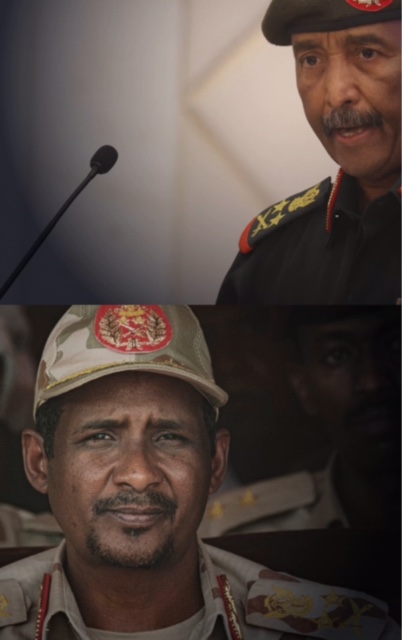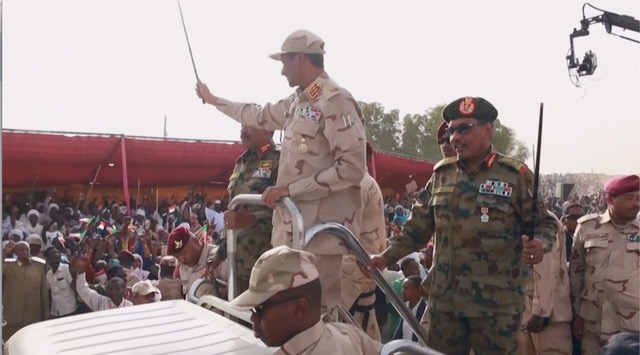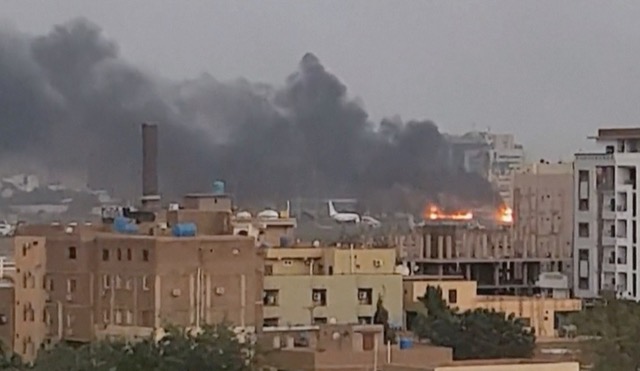This weekend, the streets of The Republic of Sudan became the fighting ground between its National Armed Forces, led by General Abdel Fattah al-Burhan, who is also the de facto Head of State of Sudan and the paramilitary forces known as the Rapid Support Forces at whose head is General Mohamed Hamdan Dagalo . Two of the country’s most powerful leaders in the Sovereign Council, the Generals Burhan and his deputy, Dagalo have pitched their military forces against each other as demands for the full integration of the RSF into the states National Army continue to face resistance.

News reports initially suggested that General Dagalo, otherwise known as Hemeti, had led his Rapid Support Forces (RSF) and had seized control of key sites across the capital and that he claimed in the early part of the conflict to have control of the Presidential Palace in Khartoum, the army’s chief residence and three of the main state airports. The spokesperson of the Sudanese Armed forces counter claimed that they had maintained full control of these sites.
Generals accuse each other of starting the conflict
Both sides according to mixed media reports, have argued that the conflict was triggered by the other – The Sudanese Armed Forces claiming that the RSF had attacked its military bases and General Dagalo, maintaining that RSF headquarters had been attacked by the Sudanese Armed Forces.
Throughout the weekend, there have been reports and video footage showing clashes between the forces and of low flying Sudanese Army fighter jets bombing RSF targets. The fighting extended across Sudan, with heavy gunfire being reported up to 300 miles away from the capital in Al Fashir and Nyala, which are areas on the border with Chad.
General Dagalo speaking on Al Jazeera Television, stated that his forces (which are estimated to number as many as 100,000) intended to capture all the National Army bases. He is reported to have referred to General Burhan as a ‘criminal’ who would either be killed or ‘face justice’.

‘Safeguarding the Country’
A Sudanese Army spokesperson referred to his duty to ‘safeguard the country’. He explained that they were using air attacks to ‘stop the irresponsible behaviour of the RSF’. Reports of airstrikes on the barracks of the RSF and their bases are said to have destroyed most of the RSF’s facilities and resources. Several of the RSF’s most decorated General’s were reported to have resigned their commissions and/or rejoined Sudanese National Army.
Most political pundits have long since believed that the outbreak of violence was inevitable as demands for General Dagalo’s Rapid Support Forces to be fully integrated into the National Army as part of the move towards civilian rule and democratic elections, continued to be a sticking point between the military members of the governing council and the civilian administrators. It is widely believed that Hemeti has been in collusion with factions of the Forces for Freedom and Change, who had been ousted from the interim government at the end of last year and who it is thought to have promised to preserve Hemeti’s power base if they could count on his support. This would be particularly pertinent, they had apparently said, in the event that the current balance of power experienced a change.
Former Sudan Prime Minister Hamdok calls for ceasefire and dialogue
On Sunday 16th April, the former Prime Minister Abdalla Hamdok, held a press conference and called for an immediate ceasefire, stating that the conflict was a:
‘…damned war, in which there will be no victor and no vanquished’ and asked for ‘a truce that allows for the creation of safe passages’.
His statements came as the death toll among the military and civilians continued to mount. As of Monday morning the number killed in the fighting is projected by the both the Doctor’s Trade Union and the World Health organisation to have exceeded 100, with as many as 365 injured including three UN workers.
International community express concerns for safety of civilians
International actors have been quick to express their concern about the deterioration of the situation in Sudan, with the US Secretary of State, Anthony Blinken making a statement that:
‘There is a shared deep concern about the fighting, the violence that is going on in Sudan, the threat that that poses to civilians, that it poses to the Sudanese nation and potentially poses even to the region…There’s also a strongly held view across all of our partners on the need for an immediate ceasefire and return to talks. Talks that were very promising in putting Sudan on a path to a full transition to civilian-led government’.
African neighbours offer to mediate
Neighboring African countries were also quick to offer mediation services. The Presidents of Egypt; Kenya, South Sudan and Djibouti were keen to arrange meetings in order to create dialogue towards reconciliation.
The Chairman of the African Union (AU) Commission, Moussa Faki Mahamat, has announced on Sunday his intention to ‘immediately’ travel to Sudan ‘to engage the parties towards a ceasefire.’ He also urged both parties to ‘protect civilians’ as he hoped to persuade both parties to:
‘…quickly adopt a peaceful solution and an inclusive dialogue to resolve their differences [and to] firmly reject any external interference that could complicate the situation in Sudan.’
While the fighting continues, fears grow for the ordinary residents caught in the artillery fire and street fighting exchanges between the two sides as air raids besiege buildings and destroy water and electricity supplies.


















